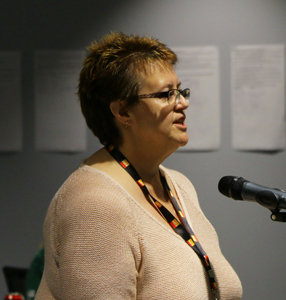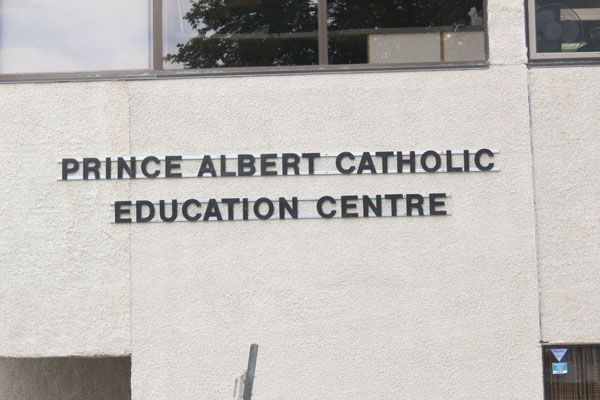A University of Saskatchewan (USask) researcher, Dr. Holly Graham (PhD), has been awarded $2.5 million over five years by Public Safety Canada to implement a crime prevention program using culture as the intervention.
According to Graham, the crime prevention project provides 10 to 19-year-old students and their families on both Little Pine and Poundmaker First Nations an opportunity to connect to their traditional Cree identity. This will include the use of traditional ways to manage conflict resolution.
“It is returning to the Cree traditional worldviews and paradigms away from Western practices and policies to address community safety. Using the Cree culture to manage challenges faced by youth in these communities. So it is a return to Cree cultures, values and beliefs,” Graham, assistant professor in the College of Nursing and USask’s Indigenous Research Chair in Nursing, said.
She said the project was initiated by two Elders—Austin Tootoosis of Poundmaker Cree Nation and the late Jacob Pete from the Little Pine First Nation. They approached her to work with them and apply for the federal grant that would help address a pressing community problem.
“They were interested in working for me because I am a member of the Thunderchild First Nation, my nursing experience and also because I am a registered doctoral psychologist. They both recognized the need to integrate mental health and wellness within this project. They wanted to work with someone that understood the challenges that impact First Nations communities,” she explained.
Both Tootoosis and Pete attended residential school with Graham’s mother, Celia Wapass-Clennell.
The approach is about holistic wellness and included reclaiming indigeneity, supporting the original family structure and bringing people together to create positive outcomes.
The idea of the project came from the communities and was co-created with leadership, kihte-ayak (person of many winters) community members, along with RCMP representation—Sergeant Karen Pelletier, Indigenous Policing Services. Chiefs Wayne Semaginis and Duane Antoine have been vital to nehiyaw wicihitwin (Cree helping Cree).
“Their commitment and leadership reflects the value of this project to their communities. This project is community-driven, which is the gold standard for all community-based research,” Graham said.
Tootoosis and Pete brought community leaders, local police and others together to share and envision what they wanted to happen, said Graham. Such true collaborative and supportive partnerships with authentic relationships to address community needs are a key part of reconciliation, according to Graham.
The intervention will be in both Little Pine and Poundmaker Cree Nation First Nation’s schools which already have cultural programming.
“This project will allow us to hire two elders, one male one female who will work in both schools. The male elder will share the teachings for the young men and the female elder will provide the necessary teachings for the young women. ”
The project’s goal is to support and build community with traditional circles using the restorative justice approach. The restorative approach is part of the crime prevention program that will be taught in schools as well as to teachers and everyone who provides front-line service in the communities. This was one of Pete’s dreams.
“Traditional restorative justice traditionally is about bringing people together to repair the harm, repair the relationships and to discuss the behaviour. It’s about providing support and teaching accountability, how to move forward in a positive way. So it’s a supportive, teachable moment that is inclusive and fosters citizenship,” Graham said.
When an issue or challenge arises, everyone in the youth’s life—parents, relatives, paraprofessionals—come together to share their feelings and perspectives about the event, explore the roots of the behaviour and create a plan to support that young person.
“It allows the opportunity for the youth to have more direct support and contact as well as being taught Cree traditional values within the school system,” Graham said.
At a recent meeting attended by Graham there was consideration for changing the schools to either 60 per cent Cree, 40 per cent English or 100 per cent full Cree immersion schools.
Graham said teaching Cree in schools reinforces culture.
“The Cree language teaches us about our relational accountability, how we are related and what our responsibilities are in that relationship.”
The program will be delivered in the two communities by seven staff—two onsite project co-ordinators, two Elders, two intervention staff (mental health therapists) and an administrator. As well, an off-site part-time administrator will work in Saskatoon to help Graham with program metrics and evaluations.
“What excites me about it is it’s really a chance to reclaim, rebuild Indigenousness … and it’s a chance to bring restorative justice practices that used to be used back into contemporary settings,” Graham said.
An Elder at each school will teach students traditional Cree culture, language, values and beliefs. They will include teachings about wahkotowin, the Cree worldview that we are all related and interconnected with each other, and to mother earth and of all creation; the medicine wheel, whose lessons include the interrelatedness of physical, emotional, mental and spiritual wellness; and the Seven Sacred Grandfather Teachings, a set of teachings for a healthy life. The teachings provide a frame for healthy relationships based on love, respect, bravery, truth, honesty, humility and wisdom.
There also will be weekly group workshops in the schools and communities that address issues such as alternatives to violence, managing emotions, self-regulation, healthy boundaries, conflict management and resolution. These workshops will offer a cultural craft component twice a month.
“The most exciting thing for me in this project is that it’s strength based, that the intervention is culture and that it was co-designed and created from the community through all aspects ( of the project.) The exact title is Cree helping Cree,” she said.
“That to me is what is exciting. It is research in its best form that is meeting the needs of the community and everybody working together toward a common goal,” Graham added.
There is also a monthly Elders’ healing and wellness plan that will feature story-based learning and sharing circles to discuss important issues such as how the justice system has been applied to Indigenous peoples, the ’60s Scoop, residential schools, and intergenerational trauma.
The program, called nehiyaw wicihitwin (Cree helping Cree), will provide youth reaching maturity the opportunity to participate in traditional rites of passage (cultural ceremony). The youth will participate in one hunting and one fishing trip annually—something already offered to Little Pine students. As well, an annual hockey camp and family camp will be held in each community.
Intervention staff will make individual counselling available to students aged 10-19 and their families, with the project team organizing further education events on topics such as bullying, gang prevention, and will bring in motivational speakers per community request.
Graham’s project is one of 40 selected across the country. At the end of five years, Public Safety Canada will assess the effectiveness of the programs and adopt best practices for its youth crime prevention programming.








